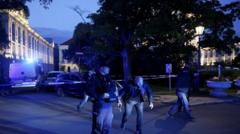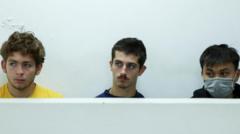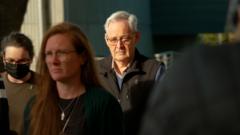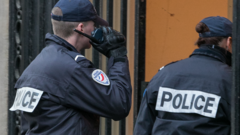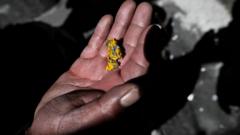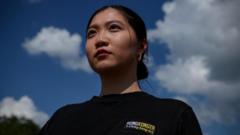Amidst rising political tensions, a national high school drama competition in Kenya faced disruption as police used tear gas to disperse crowds gathered to watch a controversial play, emphasizing the youth's role in societal change.
Tear Gas and Tension: Controversial Drama Competition in Kenya Disrupted
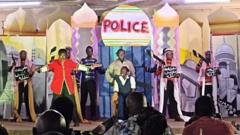
Tear Gas and Tension: Controversial Drama Competition in Kenya Disrupted
Police intervention disrupts high school drama competition amid political tensions.
Kenya's national high-school drama competition recently took a dramatic turn when police fired tear gas to disperse large crowds that had gathered to view a contentious play entitled "Echoes of War." This performance, featuring students from Butere Girls School, explores themes relevant to Kenya's political climate, particularly the impact of digital engagement in governance and the potential of youth to drive change. Initially disqualified under ambiguous circumstances, the play was reinstated by a High Court ruling, allowing it to be showcased at the festival.
Tensions escalated in Nakuru on Thursday morning when students walked out of the performance venue in protest of the police's actions against their scriptwriter, Cleophas Malala, a former senator, who was prevented from attending the students’ final rehearsals. Following his release without charge, Malala commended the students for their bold stance, declaring, "The young girls of Butere Girls have exercised an act of heroic restoration. I'm determined to ensure that 'Echoes of War' is displayed before a Kenyan audience.”
An impromptu rendition of the national anthem marked the students' exit from the hall as anti-riot police, equipped with batons and tear gas, enforced a stricter security presence. Students expressed their frustrations, stating, "There's no audience. Who are we performing for?" while voicing complaints about police mistreatment. The proposed performance attracted significant public attention, prompting discussions outside the venue, leading to further police response.
Education Minister Julius Ogamba questioned Malala’s involvement in the competition, suggesting that he lacked the qualifications of a typical teacher or theatrical director. This incident has ignited outrage, with rights organization Amnesty International highlighting an ongoing trend in Kenya of state-sponsored repression of free expression and assembly.
Opposition leader Kalonzo Musyoka criticized the police's actions and lauded the students' courageous decision not to perform. The Orange Democratic Movement (ODM) called for the students' right to perform their play, positioning the narrative as reflective of the generational divide in Kenya and the urgent call for innovative solutions to longstanding issues, which previously sparked youth-led protests.
Tensions escalated in Nakuru on Thursday morning when students walked out of the performance venue in protest of the police's actions against their scriptwriter, Cleophas Malala, a former senator, who was prevented from attending the students’ final rehearsals. Following his release without charge, Malala commended the students for their bold stance, declaring, "The young girls of Butere Girls have exercised an act of heroic restoration. I'm determined to ensure that 'Echoes of War' is displayed before a Kenyan audience.”
An impromptu rendition of the national anthem marked the students' exit from the hall as anti-riot police, equipped with batons and tear gas, enforced a stricter security presence. Students expressed their frustrations, stating, "There's no audience. Who are we performing for?" while voicing complaints about police mistreatment. The proposed performance attracted significant public attention, prompting discussions outside the venue, leading to further police response.
Education Minister Julius Ogamba questioned Malala’s involvement in the competition, suggesting that he lacked the qualifications of a typical teacher or theatrical director. This incident has ignited outrage, with rights organization Amnesty International highlighting an ongoing trend in Kenya of state-sponsored repression of free expression and assembly.
Opposition leader Kalonzo Musyoka criticized the police's actions and lauded the students' courageous decision not to perform. The Orange Democratic Movement (ODM) called for the students' right to perform their play, positioning the narrative as reflective of the generational divide in Kenya and the urgent call for innovative solutions to longstanding issues, which previously sparked youth-led protests.

